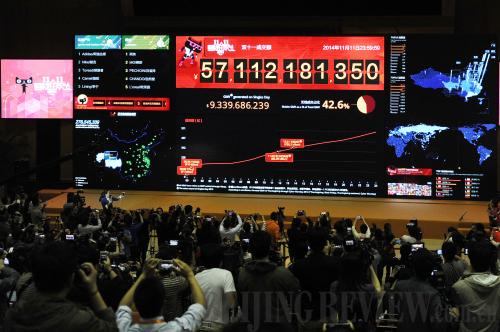|
 |
|
SHOPPING SPREE: The huge screen shows the value of transactions reached during the November 11 online shopping carnival in Alibaba Group. During the Singles Day shopping frenzy, the transaction value of Tmall, Alibaba's business-to-business platform, reached 57.1 billion yuan ($9.3 billion), with the participation of netizens from 217 countries and regions (JU HUANZONG) |
When the huge screen at Alibaba Group's office building in Hangzhou, capital of east China's Zhejiang Province, recorded the total transaction value of the day hit 50 billion yuan ($8.17 billion) at 10:30 p.m. on November 11, Jack Ma, founder and Executive Chairman of U.S.-listed Alibaba, showed up in a green leisure wear and expressed his willingness to turn November 11 into a worldwide shopping carnival within four years.
Since 2009, the day of November 11, selected as China's premier online bargain shopping day and named Singles Day because of all the number 1's in the date's permutation, has begun to catch people's eyes with its many sales. According to statistics from Alibaba, its business-to-customer (B2C) website Tmall.com registered a transaction value of 57.1 billion yuan ($9.32 billion) on this year's Singles Day, an increase of 21 billion yuan ($3.43 billion) from the previous year.
Over the past five years, besides Alibaba, a cluster of e-commerce companies like 360buy.com, the country's second largest B2C website; Suning.com, the online platform of China's largest electrical appliance retailer; and Amazon.cn, China operation of Amazon, have also joined forces in Singles Day online promotions and witnessed an exponential growth of transaction volume. For example, this year it took a mere 15 hours for 360buy.com to double its sales volume on the Singles Day of last year.
Data fromiResearch, a leading market research firm focusing on China's Internet industry, showed that China's e-shopping market size had expanded from 250 billion yuan ($40.82 billion) in 2009 to 1.85 trillion yuan ($302.08 billion) in 2013, 7.4 times as much as that in 2009. By continuously gaining ground, online shopping accounted for more than 10 percent of the total retail sales of consumer goods in the second quarter of this year.
As online shopping gains increasing popularity among Chinese consumers, the Singles Day has morphed into a national consumption day in the country
New trends
According to Alibaba, consumers from 217 countries and regions joined Chinese people in the snapping up on the Singles Day. As Alibaba's Chief Operating Officer Zhang Yong suggested, Singles day has shown a tendency to become a worldwide consumption festival.
Cao Lei, Director of China e-Business Research Center confirmed the strong growth momentum of international online shopping and the possible globalization of Singles day. According to Cao, there have been more than 5,000 cross-border e-commerce platforms in China with a total cross-border transaction value of 3 trillion yuan ($489.86 billion) in the first half of this year. During this shopping carnival, there are even orders from countries like Seychelles and Barbados.
Placing orders with smart phones has become a general trend since the popularization of the devices in 2010, testifying that an economic force is taking shape in the mobile market.
During this year's Singles Day, the mobile phone app of Alipay, a third-party online payment platform of Alibaba, saw a transaction value of 24.3 billion yuan ($3.97 billion), up 454 percent year on year, accounting for more than 42.6 percent of the total. Occupying the shopping entrances of WeChat and QQ, two kinds of instant messaging software by Tencent, 60buy.com also saw its mobile transactions soar to a value eight times as much as last year's, accounting for 40 percent of the total.
|
